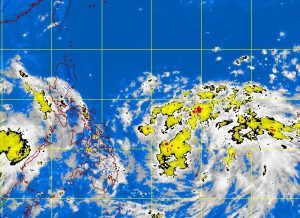Low pressure area expected to bring rain to Visayas, Mindanao
MANILA, Philippines—A low pressure area brewing in the Pacific Ocean is forecast to enter the Philippine area of responsibility Sunday morning and bring rain over the Visayas and Mindanao.
The disturbance is expected to spawn scattered rainshowers and thunderstorms over Eastern Visayas and Eastern Mindanao Sunday night, weather forecaster Aldczar Aurelio said.
“The rain will be moderate to heavy. Residents there should be on alert for landslides and flashfloods,” he said in a telephone interview Saturday.
The low pressure area was located 1,280 east of Mindanao Saturday morning.
But until Sunday morning, the southwest monsoon was expected to continue to bring occasional rains over the western section of Central and Southern Luzon, the Philippine Atmospheric, Geophysical and Astronomical Services Administration said.
Article continues after this advertisementWestern Visayas would experience mostly cloudy skies with scattered rainshowers and thunderstorms. The rest of the country would have partly cloudy to cloudy skies with isolated rainshowers or thunderstorms, the weather bureau said.
Article continues after this advertisementMeanwhile, the so-called “leap second” will be added to the world’s atomic clocks at midnight Saturday to keep in step with the slowing rotation of the Earth. The atomic clocks are the reference point by which the world sets its watches.
“We add the leap second because of the difference between the international atomic time and solar time. The rotation of the Earth should be synchronized with the atomic clock. The atomic clock is more stable, while Earth rotation changes,” Dario dela Cruz, chief of Pagasa’s Space Sciences and Astronomy Section, said in an interview.
“It has no effect. All clocks will be automatically adjusted,” he said.
A leap second has been added every few years in the past because of the slowdown in the Earth’s rotation caused by tides, earthquakes and other natural phenomena.
